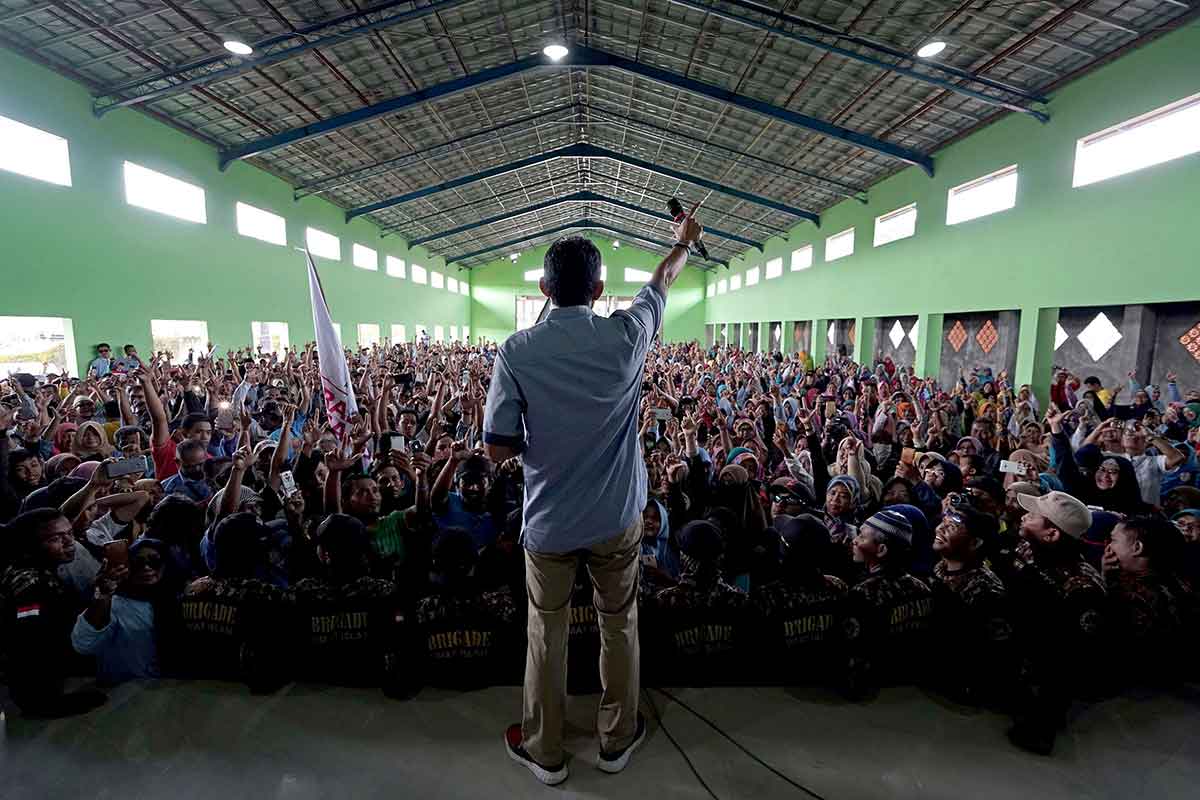Indonesia’s Sandiaga Uno has spent nearly US$100 million of his private equity fortune to defeat Joko Widodo in next month’s election. It may be a down payment on his own presidential ambitions.
Just a few years ago, Uno was relatively unknown in Indonesian politics. Now he’s the vice-presidential nominee on a ticket with former general Prabowo Subianto, the latest milestone in a steep rise highlighted by a successful campaign in Jakarta’s gubernatorial race that saw him engineer an unlikely victory two years ago against one of the president’s closest political allies.
The graduate of George Washington University is now targeting the president’s traditional base in Central Java, part of a campaign that’s already included 1,500 separate stops around the country.
"It’s a tough environment because we’re fighting the incumbent but we have good momentum," Uno said at a rally on Saturday surrounded by thousands of supporters. "The people basically understand our message of wanting to improve the economy, provide good jobs and especially jobs for the youth – we want to focus on stabilising the cost of living, food prices."
Marathon man
After running in more than a dozen marathons in cities from New York to Tokyo and London, Uno is now in the biggest race of his short political career. But with Prabowo and Uno facing the added challenge of trying to unseat the incumbent – something that’s not been done in Indonesia’s brief history of direct presidential elections – observers see this campaign as a stalking horse for a more serious tilt at the presidency in 2024.
"I’ve always been very up front," Uno said. “The political pundits may have their own analysis, their own predictions. But my focus now is 17 April. If we lose focus and start thinking about the future I think we’re going to miss this shot."
Win or lose next month, Uno has risen from relative obscurity just a few years ago to be at the top of a new generation of leaders. At 49, he’s young by Indonesian political standards and he’s attracted a huge following among younger voters and the nation’s emak-emak, or housewives. At a weekend campaign rally, one supporter asked him if she could be his "second wife."
"Sandiaga Uno clearly has ambitions to run for the highest office and he has used his vice-presidential campaign to build an impressive national profile that will support any later run for the presidency," said Ben Bland, director of the Southeast Asia project with the Lowy Institute in Australia. "After a successful business career, he has that other all-important political commodity in Indonesia: the money to fund a campaign, as he is doing for Prabowo."
Big spender
Uno made his fortune with PT Saratoga Investama Sedaya Tbk, an investment holding company he co-founded almost 20 years ago in the wake of the Asian financial crisis. Now, after seven months on the hustings, traversing a country that would stretch from New York to London, he’s seen it dwindle from somewhere in the vicinity of US$360 million.
"It’s going to be significantly down on 2018," Uno said. "I’ve lost maybe a third of my net worth," he said, adding that he has now spent "somewhere around" US$100 million on the campaign.
If confirmed, the outlay would represent a significant increase on the amount already filed with authorities, which in February showed Uno had contributed IDR95.4 billion of the IDR134 billion in total funds for the Prabowo-Uno campaign. In 2014, Jokowi’s campaign spent IDR293 billion, according to local media reports.
Jokowi country
It’s nearing noon in the Central Java city of Sragen and Uno is set to take the stage at a major rally that marks the beginning of the "open campaign period" before a blackout is instituted a few days before the poll. It’s no accident he chose to hold the event at Sragen, a city in the middle of Jokowi’s heartland of Central Java and about 20 minutes by car from his personal residence in Solo, along a toll road the president built.
"There is a disconnect and the infrastructure focus that the government has is not yielding good quality jobs that the people seek," he said, before addressing a 5,000-strong crowd made up mostly of millennials and young entrepreneurs.
It’s a line Uno and Prabowo have repeated in a bid to win over voters disgruntled by the economic disparity that’s evident across the archipelago. While Southeast Asia’s biggest economy is holding up as others falter, growing at about five percent, it’s well short of the seven percent target set by Jokowi almost five years ago.
Even the island of Java, the nation’s economic powerhouse, sees a disconnect from province to province. The national jobless rate is near a 20-year low at 5.3 percent, but in West Java, which borders Jokowi’s home province, it’s above eight percent.
The key economic indicators provide fertile ground for a campaign that points to the loss of jobs, including to foreigners, even as the government produces figures to show the number of foreign workers in Indonesia is small. Like Donald Trump did in the lead up to his win in the 2016 United States (US) presidential election, Prabowo and Uno have vowed to seek a better deal with China.
Whatever it takes
A survey published Monday showed Jokowi on 53.6 percent versus Prabowo on 35.4 percent. Still, in an era where polls have been wildly wrong, the Indonesian election may be a lot tighter than current polls suggest.
"It’s like a marathon," Uno said. "Prabowo and I have been surprised that we did not get more support from the business community so we need to sell more. I will do whatever it takes to make us competitive." - Bloomberg
